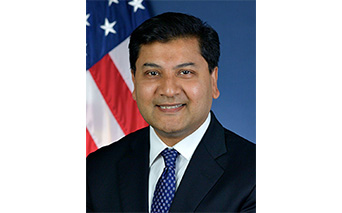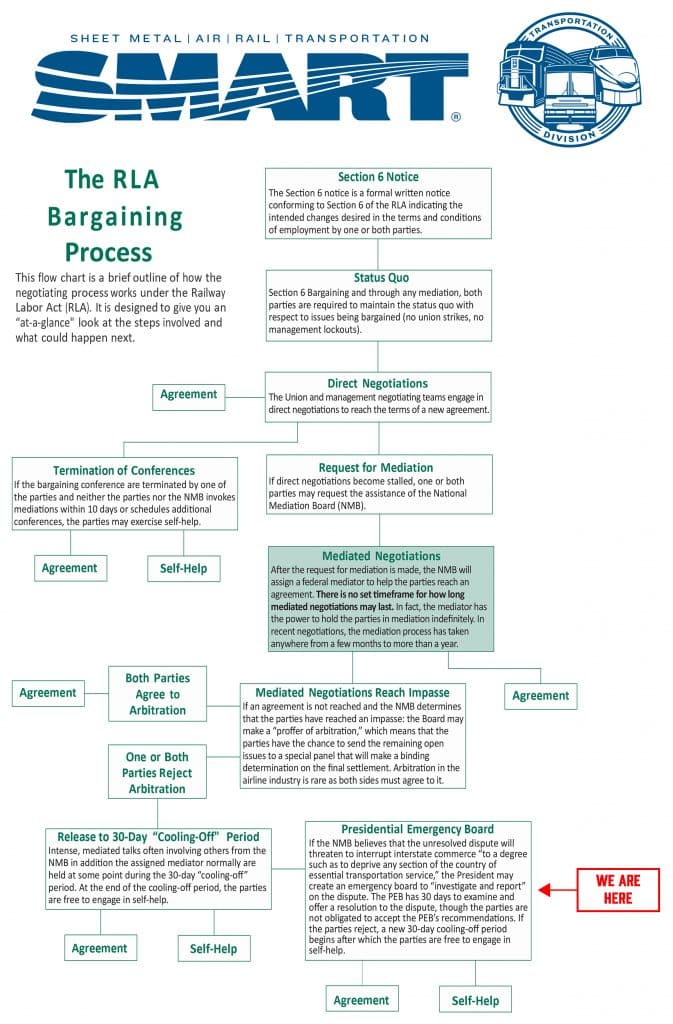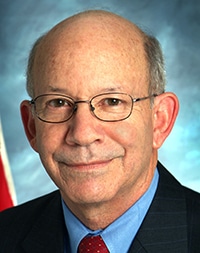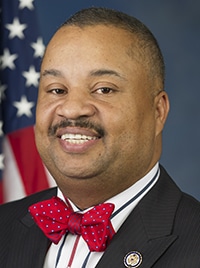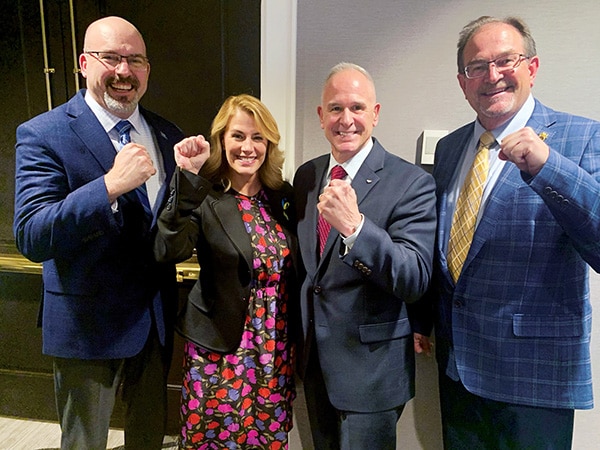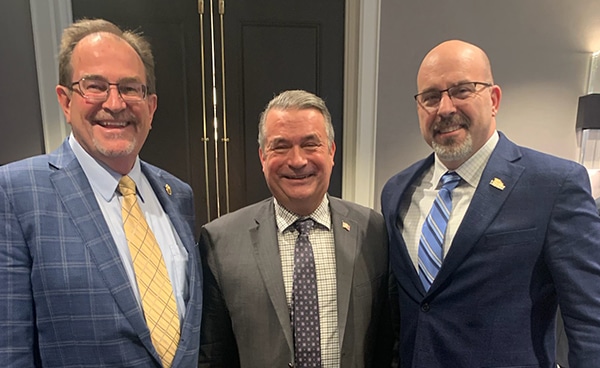A number of questions have arisen regarding the union’s ongoing educational efforts, Transportation Division Chief of Staff Jerry Gibson sat down for a Q&A clarifying the purpose of the 2022 SMART Transportation Division Annual Meeting and discussing how these efforts have changed as a result of the pandemic.
President Ferguson has been looking forward to hosting an annual regional meeting since the start of his administration in October 2019. Being that it was to be held in our home office base in Cleveland, it simply added to that excitement. Unfortunately, as we are all well aware, the early stages of COVID took away our initial opportunity in 2020. Last year a meeting was planned to be concurrent with the SMART Business Agents meeting in New York City, but once again, the pandemic had other plans with COVID variants making it unsafe.
The meeting locations are selected years in advance, so we knew when and where it would be held, but other issues presented themselves, so we had to delay providing any in-depth information. We knew we had to make some changes, but it took some time to work this all out. The long two-year interval allowed us the opportunity to pause, review everything that we have done in the past, and determine what changes were needed for the future. We had some challenges presented to us that were pandemic-related, but we also knew that there were some long-standing concerns that had, frankly, been growing for years. We have already reduced the number of “Regional Meetings” from three to two and now down to one due to reduced attendance. The question raised was, are they really “regional” then? The conclusion was that the old training and meeting model where local officers were expected to attend one big meeting in one place once a year had run its course. A change had to be made.
So, after reviewing all of the hurdles, positives and negatives, we knew what we needed to do, so President Ferguson presented the idea to the TD Board of Directors, whose members voted unanimously to make the change.
Well, we knew that the COVID-related safety requirements that the City of San Francisco placed on us would create an issue. We understand that some of our officers and members have elected not to be vaccinated, and you had to provide proof that you were vaccinated and boosted to enter the facility. No exceptions. Add that to the trend of reduced attendance, it made it very difficult to sign contracts for room, food and beverage guarantees. If we think 600 people are going to attend, and only 400 actually do, we still pay for 600. We need to be very aware of how every last dollar of our members’ dues money is being spent and the financial pressures that the organization has been experiencing at all levels — local, state and national, are significant. It takes a considerable investment in time, expense, and personnel to put one of these together. In addition, we heard loud and clear the long-standing concerns from many of our locals that these meetings have become a huge financial burden. No one disagrees that the training is wanted and in demand, it is simply a matter of “Can our local afford it?” It has become a paradox. We can’t afford to go, but we cannot afford not to either.
It’s not. In short, the old format is being replaced with two separate, but needed, training and meeting structures. Starting in 2022 and into the foreseeable future, the single Annual “Regional” Meeting will be reserved for General Committee and State Board executive officers. It will allow our SLB and GC officers to convene, attend training and presentations developed specifically for them, as well as provide a venue to discuss their complex issues in depth. It ensures we are all on the same page, provides an opportunity to freely exchange solutions, and discuss what we need to tighten up. That’s never been done before and long overdue. It will also be a joint meeting with their Sheet Metal counterparts. One of the intentions behind the SMART merger was to share costs and better allocate resources. This accomplishes that goal while allowing us to share our experiences and knowledge with each other.
President Ferguson is adamant that training is the backbone that supports our organization and ensures its success. We have put a lot of resources toward it while taking into consideration the suggested changes and concerns that have been expressed since he has taken office. This includes the aforementioned financial stress it places on a local. We knew that there is a great and constant need for training our local officers, so we created a true “regional” meeting format that should reduce both the travel time and expense of sending an officer to one of these training events. The end result was the implementation of Regional Training Seminars.
In 2021, there were four Regional Training Seminars held, each unique with a true “regional” feel to them. Some were two-day events, and others were three. All were within a reasonable driving distance of a number of locals and offered training for all Local officers: Presidents, Trustees, Secretary/Treasurers, Legislative Representatives and Local Chairpersons. Note that I said “driving distance” as this is by design and saves considerable time and money for the locals instead of flying their officers across the country to a single annual meeting. These RTS’s took place in Columbus, Ohio; Nashville, Tenn.; Duluth, Minn.; and Michigan City, Ind., The International at the behest of President Ferguson, provided the presenters and some financial assistance with the State Directors and General Chairmen of Jurisdiction chipping in and handling the arrangements. All of these meetings were very successful and allowed us to develop a meeting agenda for future use. The only complaint received from the attendees was that they wish they had more training time. So we’ve adjusted the format this year to allow extra time.
As mentioned previously, the RTS is focused on Local officer training, but more than that, we can be flexible and more specifically target particular concerns by craft, carrier, and geographic locations. We’re able to focus on an issue important to a region and can adjust the length and types of training to be more in tune with what people in that location want. Something that’s happening in Chicago might not be a concern for someone in Laramie, Wyo. The same goes for areas where we have more bus, passenger and transit members. Their concerns are not the same as the places where the vast majority of our members work on freight railroads. Those concerns can differ and will be addressed, while still maintaining our core local officer training provided by experts in each field. Simply put, the RTS model provides cost savings to all involved, while allowing for more intimate and specific training for all local officers. President Ferguson has attended every one of the Regional Training Seminars and plans to continue to do so. It gives everyone accessibility and a chance to make a personal connection and clear up any misconceptions or misinformation straight from the source. President Ferguson enjoys the personal interaction with the local officers and typically closes out the meetings with a “nothing off the table” Q&A session. Another huge advantage is that these RTS’s can be scheduled year-round, so if you cannot make one, there likely will be another.
Well, I think we covered this, but in short, only in travel time and cost. The complaints about the prohibitive financial investment and time going to the single “big” meeting have become louder and it was time to react. With the new format, we come to you. Ideally, we want on average 20 to 30 officers attending each class (President, LR, S&T, LC), so I guess the participants will be less, but that allows for more intimate training, so that should not be viewed as a negative. It is a true collaborative effort with the International, State Boards, and GC offices all sharing in the costs — it is less of a financial burden for all involved, but more so for the locals than anyone.
We encourage people, even those that have attended the old-school Regional Meetings in the past, to attend one of the RTS’s. Instead of a shotgun approach, we are narrowing the focus and with more in-depth, specific training of all local officers, bus, freight, passenger, rail and transit. These are opportunities not to be missed and are not short of anything previously offered.
We encourage locals and their officers to reach out to their General Committee and State Board offices of jurisdiction. They can also reach out to the President’s Department in our office. Last year, it was the GCs and SLDs reaching out to us once the word got out. Going forward, I think the best way to determine where and when to schedule a Regional Training Seminar will be based on how many locals in a geographic location communicate they want to participate or host one. Once host locations are identified and chosen, information will be shared on our website and social-media platforms about how to attend. I can share that this process is already well on its way with several scheduled or in the works. There is one scheduled for late April at LACMTA in Los Angeles. Requests have been made for a bus-oriented one in northern California and one for freight rail in San Antonio, Texas, to name a few.
As I stated previously, the decisions of changing how we train our officers were not made lightly. Then when you add the complex COVID restrictions that remain and essentially forced changes, I certainly hope everyone can see the reasoning behind the delay. Further, we have yet to do a “site visit” and work out all of the details with the hotel. That happens at the end of this week … on Good Friday no less. We are very hopeful to have everything fleshed out so that our General Committee and State Legislative Board executive officers can register for the San Fran meeting within the next few weeks, with a soft goal of May 1. We simply do not want to put information out and then have to retract it. So once the details have all been finalized, we will announce it on all of our media outlets.
Absolutely. As I stated, President Ferguson wants training made available to members and officers alike. Understanding that we work varying schedules and learn different ways, he asked that it be in different formats, times, and places, and it started with the overhaul of our SMART website and the addition of our new Member Portal. This portal allows us to protect member-only information, including training videos and supporting documents, for the very first time. We have been developing SMART University for these very reasons, offering 24/7/365 training options for our members and officers. We have recruited subject experts who have completed an extensive amount of work and are close to launching some of this material in the very near future … I am talking weeks, not months. Many of the topics covered at the meetings will be available online with a robust amount of material available, and it is our plan to continue to add to it as suggestions are made and topics become known. I think each and every member and officer will find something of value at SMART U.
